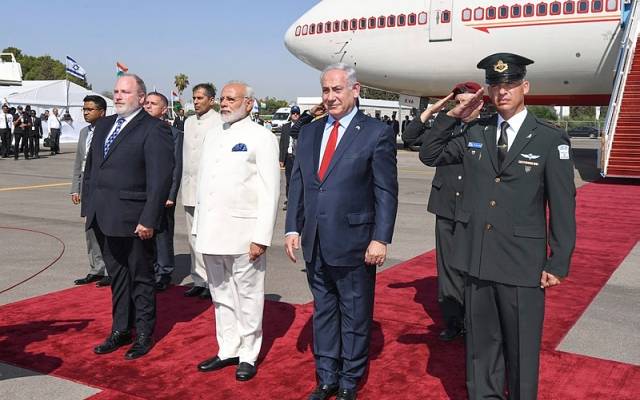Indian Prime Minister Modi’s historic Israel visit underscores burgeoning ties between the two nations.
India’s Prime Minister Narendra Modi touched down at Ben Gurion Airport Tuesday afternoon, kicking off the first-ever visit to Israel by a sitting Indian head of state.
Prime Minister Benjamin Netanyahu and other top Israeli officials greeted Modi at the airport with a “segel aleph” ceremony—an honor reserved for the most important visiting dignitaries, such as American presidents and popes.
Israel has been ready for Modi for “a long time,” Netanyahu told him at the ceremony. “We’ve been waiting almost 70 years in fact because yours is truly a historic visit. We receive you with open arms. We love India. We admire your culture, we admire your history, your democracy, your commitment to progress. We view you as kindred spirits in our common quest to provide a better future for our peoples and for our world.”
“I’m confident of the success of our partnership for many reasons: First, is the talent of our peoples. It’s been said, Prime Minister, that in Silicon Valley in California the two most common languages overheard are Hindi and Hebrew. Occasionally, one hears some native English too. Second, I believe in the success of our partnership because of the great sympathy between our peoples – the natural comradery between Indians and Israelis,” Netanyahu added.
Netanyahu is accompanying Modi throughout his visit, which has been billed as a celebration of the 25th anniversary of the establishment of Israel-India diplomatic relations.
Daniel Pipes, president of the Middle East Forum think tank, told JNS.org that Modi’s visit “reciprocates Israeli prime ministerial visits to India and provides a symbolic and substantial confirmation of Israel’s importance to India.”
“At a time of European decline and anti-Zionism, having a population almost twice [Europe’s] size with a booming economy in Israel’s corner has vast potential importance,” Pipes added.
In addition to holding several meetings with Netanyahu, Modi is meeting with Israeli President Reuven Rivlin and Israeli and Indian business leaders, as well as members of Israel’s Indian community.
A Common Sense of Purpose
In light of burgeoning Indian-Israeli cooperation in the fields of agriculture and water technology, Modi toured the Danziger Flower Farm—accompanied by Netanyahu and Israel’s Agriculture Minister Uri Ariel—and will also visit a desalination plant in Haifa.
The Danziger Farm named a variety of white chrysanthemum after Modi.
Other stops on Modi’s packed tour of the Jewish state included the Yad Vashem Holocaust Remembrance Center, where the leaders toured the Hall of Names and the Children’s Memorial and participated in a memorial ceremony in the Hall of Remembrance.
Following the visit, Netanyahu suggested that he and Modi visit Theodor Herzl’s grave, and Modi agreed.
At the Israel Museum on Wednesday, Modi will meet an Israeli youth whose parents were killed in the Mumbai Chabad House terrorist attack in 2008.
A meeting with the Palestinian Authority in Ramallah is notably absent from Modi’s agenda, with the Indian government saying it believes the prime minister’s standalone visit to Israel serves to further “underline the significance of India’s special ties with the Jewish nation.”
“Modi’s visit marks 25 years of ties between Israel and India. This is no small feat for both countries, given the complex politics of the Indian subcontinent and the Middle East,” Dr. Jonathan Schanzer, senior vice president of research at the Foundation for Defense of Democracies think tank, told JNS.org.
Schanzer added, “The relationship is rooted in a common sense of purpose—the fight against extremist interpretations of Islam in a tough neighborhood. But more recently, the two countries have engaged in big business, particularly in the field of defense. The relationship can be expected to deepen further with this visit, as both sides can learn from one another in other fields as well.”
By: JNS.org and United with Israel Staff
Do You Love Israel? Make a Donation - Show Your Support!
Donate to vital charities that help protect Israeli citizens and inspire millions around the world to support Israel too!
Now more than ever, Israel needs your help to fight and win the war -- including on the battlefield of public opinion.
Antisemitism, anti-Israel bias and boycotts are out of control. Israel's enemies are inciting terror and violence against innocent Israelis and Jews around the world. Help us fight back!




